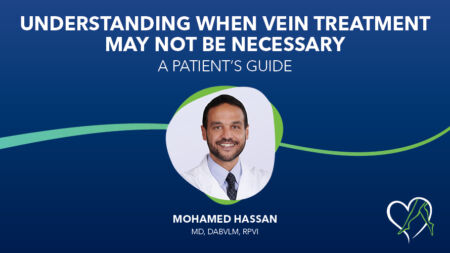
Medically reviewed by Mohamed T. Hassan, MD, DABVLM, RPV, on August 4, 2023
Mohamed T. Hassan, MD, DABVLM, RPVI, is a fellowship-trained physician specializing in venous and lymphatic diseases. He is double board-certified in internal medicine and in venous & lymphatic disorders. He has been practicing for over 14 years and has dedicated his career to diagnosing and treating venous conditions.
When it comes to healthcare decisions, it's crucial for patients to have a clear understanding of when medical intervention is necessary and when it may not be required. In the case of vein treatment, it's important to recognize that not all vein-related issues require immediate medical attention. In this blog, we will explore situations in which vein treatment may not be necessary, allowing patients to make informed decisions regarding their healthcare.
Vein treatment may not be necessary if you experience mild symptoms that do not significantly impact your daily life. For example, occasional and tolerable sensations of heaviness or mild swelling in the legs may not require immediate medical intervention. In such cases, lifestyle modifications and self-care measures, such as regular exercise, wearing compression stockings, and elevating the legs, may be sufficient to manage the symptoms effectively.
If you are primarily concerned about the appearance of your veins but do not experience any pain, discomfort, or functional limitations, vein treatment may not be essential. Varicose veins or spider veins can be primarily a cosmetic issue, and unless they cause significant distress or affect your self-esteem, medical intervention may not be necessary. It's essential to have a realistic assessment of your own priorities and consider the potential benefits and risks associated with treatment.
In some cases, individuals may have varicose veins or other venous issues, but these conditions do not significantly impact their quality of life. If your symptoms are sporadic, minimal, or easily managed through self-care measures, it may not be necessary to seek vein treatment immediately. Regular monitoring and conservative management can be appropriate in such situations, with treatment considered only if symptoms worsen or complications arise.
If your vein-related symptoms have remained stable over time and have not worsened, vein treatment may not be immediately necessary. Venous conditions such as varicose veins or spider veins can develop slowly and may not progress to a point where treatment becomes a medical necessity. However, it is still important to monitor any changes in symptoms and consult a healthcare professional if concerns arise.
Vein treatment may not be necessary if you have minimal risk factors for complications such as deep vein thrombosis (DVT) or venous ulcers. For instance, if you have no personal or family history of blood clots, and your lifestyle includes regular physical activity and avoidance of prolonged immobility, the need for immediate vein treatment may be lower. However, it's important to maintain a healthy lifestyle and be vigilant for any new or concerning symptoms.
Conclusion:
In certain cases, vein treatment may not be necessary if you experience mild symptoms, have primarily cosmetic concerns, or if your symptoms have minimal impact on your quality of life. It's important to consider the severity of your symptoms and the potential risks and benefits of treatment and consult with a healthcare professional to make an informed decision. Remember to monitor any changes in symptoms and seek medical advice if concerns arise or if symptoms worsen over time.
Center for Vein Restoration (CVR) is the leading provider in the diagnosis and treatment of venous insufficiency, also known as vein disease. Our 70+ board-certified physicians, such as Dr. Mohamed T. Hassan, help over 200,000 patients annually at our 110+ vein clinics across the United States. There’s probably a CVR vein center near you!
Schedule an appointment ONLINE, or call 240-965-3915 for more information.